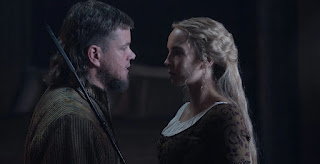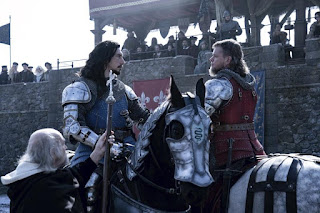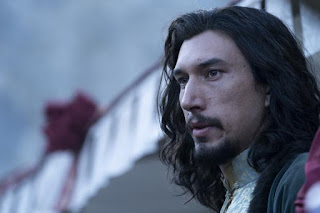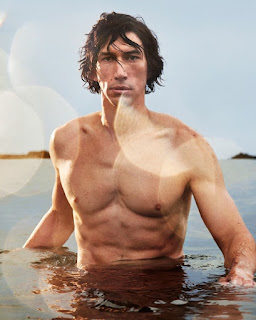Ridley Scott’s Epic drama The Last Duel is a film that's all too rare on the current field of Hollywood battles. At first we chalk it up to opening jitters, an awkward if handsomely shot peek through one of Sir Ridley’s self-serious windows into the past. And we stay in that creeky register as we follow Jean de Carrouges, a valiant fighter and man of honor with all the luck of Job. First the plague claims his first wife and child, then he is forced to pledge fealty to Count Pierre d’Alençon (Ben Affleck), who treats the squire with nothing but disdain. And then, to add a poisonous cherry on his sundae of shit, his lifelong friend Le Gris starts claiming all of de Carrouges’ inheritance. Thick-skulled, rough, and bearing a nasty scar on his cheek, Carrouges is hardly a poster boy for romantic chivalry. When he proposes marriage to Marguerite (Jodie Comer), a disgraced nobleman’s beautiful daughter, he doesn’t exactly sweep her off her feet; given her family’s financial situation, it’s literally an offer she can’t refuse, and the modest spoils of her dowry accrue to his cause. Told in three chapters that each follow a different perspective, “The Last Duel” doesn’t play “Rashomon” with the question of sexual assault. The film is unambiguous about Le Gris’ crime, and so too is his victim, who tells her husband point blank, “He raped me.” Damon and Affleck picked up the pen, teaming with Nicole Holofcener for the segment of Marguerite.
Damon effortlessly slips into the hapless doof role he trots out, somewhat brusque but loyal to Marguerite. Driver reverts to cerebral hulk, self-satisfied and smug about it; and Affleck is just an absolute joy whenever he’s onscreen. Jodie Comer finds surer footing in the final chapter where she excels. As the film reframes the whole sordid affair from Marguerite’s view, it also shows its cards in a way “Rashomon” would never dare, which is, a real break with the framework. But in seizing this newly found moral clarity and building toward the bruising showdown between Carrouges and Le Gris, Scott kicks the ball back toward his side playground while giving Comer room to shine. De Carrouges sees himself as a good and brave man, unfairly treated by his superiors. When he returns from a trip, his wife informs him that she was raped by Le Gris while he was away. De Carrouges vows to bring him to justice. To Le Gris, his sex act with Marguerite might be bold but driven by passion, and perhaps mutual longing—though certainly it's not consensual. Damon and Affleck wrote the first two sections, and handed over the third, of Marguerite’s account, to Nicole Holofcener.
The film, adapted from Eric Jager’s 2004 non-fiction book about the true history, has naturally been building to this new filmic account. Jodie Comer takes control of the film as it captures Marguerite’s experience being pressured to birth an heir (something that can only happen, she’s told, if she also finds pleasure in sex with her husband) and her savvy stewardship of the castle while De Carrouges is away. Many of the dueling perspectives of the film—slyly self-aware—reverberate with today’s #MeToo struggles. It’s tempting to think “The Last Duel” should have just been Marguerite’s account, but so much of the film’s pleasure is seeing Damon, Affleck and Driver—each playing a different type of guy—gradually dismantle and even lampoon their own charms. Through all these overlapping approaches, “The Last Duel” reveals itself as something all too rare on the current Hollywood field of battle: an intelligent and genuinely daring big budget melee that is—above all else—the product of recognizable artistic collaboration. Source: indiewire.com
The Last Duel is simultaneously a complex and unambiguous exercise of old school cinema. It seems to explore some shades of gray by showing how different people may have a different interpretation of a same event. However, applied on a topic as sensitive as rape, especially in our #MeToo era, that exploration becomes increasingly difficult, due to the movie operating under a moral imperative that there must not be a sliver of ambiguity left for the audience about what really happened here, who's right and who's wrong. In Rashomon, the different narratives are way more largely contradictory and the whole point is that there may be no such thing as "the truth" free of biased subjectivities. But The Last Duel cannot follow that path, because of the intentions of Ridley Scott and specially Matt Damon in trying to update this sensitive subject to a modern audience. "You Shall Be Damned!!—howled by a vengeful De Carrouges imparting justice in name of his wife—is one of the most satisfying lines of any movie all this year.
"The accusations that have now come out against Weinstein are the kind of sexual predation that keeps me up at night", Damon told Deadline in 2017, adding that he had never seen inappropriate behaviour during time spent making films with Weinstein, but he suspected of "his womanizing ways." "This type of predation happens behind closed doors, and out of public view. If there was ever an event that I was at and Harvey Weinstein was doing this kind of thing, I would have stopped it. I would never, ever, ever try to ignore a story like that. I just wouldn't do that. It's not something I would do, for anybody." More recently Damon reiterated: “Weinstein was a bully. These are legendarily badly behaved people. I think it’s sad when people have abused their power just because they were successful.”
On the surface, the structure of The Last Duel seems to be about how our views may be biased and our memories may be colored. And on several occasions after the fact, we're led to understand that Jacques Le Gris genuinely doesn't believe that he raped Marguerite. There was something potentially risky, but not uninteresting, to explore here, about what we would call "rape culture" nowadays. It's hard to believe that Le Gris, who has been established as a womanizer, spending seemingly half his night in orgies lifted straight from Game of Thrones, has no idea that this lady was not willing. Source: bbc.com
Facial cues could inform heterosexual women, but not men, if a potential mate is more interested in casual sex than a committed relationship. Researchers found that women are really good at judging which men are only interested in short-term relationships just by reading their faces. Apparently, men with longer faces, higher foreheads, longer noses, and larger eyes tend to be more open to casual sex, and women can pick up on it. The team of researchers from Macquarie University in Australia embarked on this study starting from a debate about the mechanics of attraction in humans. The Australian researchers hypothesized that being able to tell whether someone is interested in a monogamous relationship or casual sex could be the kind of information that humans may be able to extract from visual cues, such as facial traits. 103 white individuals, both male and female, had to complete a survey that assessed their level of sociosexuality. The researchers then associated the sociosexuality scores with facial shape characteristics in men, but not in women where no reliable association could be found. Interestingly, women’s perception of male sociosexuality matched the men’s self-reported sociosexuality scores, showing that women can predict some of men’s sexual desires and intentions from reading their faces. However, males were terrible at this task. Their perception of women’s sociosexuality did not match the women’s self-reported attitudes and behaviors towards casual sex. Lastly, the researchers used the data gathered in the previous studies to make computer-generated pairs of portraits representing high- and low-sociosexuality faces. Participants correctly identified high-sociosexuality faces better than chance—yet again, just in men and not women. The researchers suspect that the sociosexual orientation reflected in males’ faces may be due to variable levels of testosterone. Men with higher testosterone tend to have certain traits as a wider brow, a longer nose, and a wider distance between the eyes. Often, these high-testosterone men tend to express more promiscuous tendencies. Source: www.sciencedirect.com




















No comments :
Post a Comment